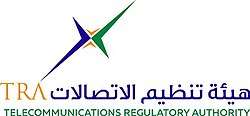Telecommunications Regulatory Authority (UAE)
Telecommunications Regulatory Authority (TRA) is the federal telecommunications regulatory agency of the United Arab Emirates.
 | |
Native name | هيئة تنظيم الاتصالات |
|---|---|
| Government agency | |
| Headquarters | , |
Key people |
|
| Website | www.tra.gov.ae |
Purpose
The UAE Telecommunications Regulatory Authority (TRA) was established in 2003[1] to regulate the Information Communications and Telecommunications (ICT) sector in the United Arab Emirates (UAE) and to ensure sustainability, competitiveness and transparency among the service providers[2] , customers and shareholders. The TRA is a regulatory body with more than 1000 employees, it oversees the telecom sector and the licensees in the UAE in accordance with the Federal Law by Decree No. 3 of 2003 and its Executive Order, and implements the directives of the Board of Directors. The TRA is an independent body and its duties include ensuring telecom services are available to all provinces of the country, assuring that the licensed operators fully follow established rules and regulations and developing telecom sector.
The TRA has three offices, the headquarters, Al Khalidiyah office in Abu Dhabi, and a Dubai office. Through these offices, the TRA tries to ensure adequacy in the ICT service across the UAE, guaranteeing that all the service providers are committed to their license obligations. The TRA is responsible for representing the country in regional and international forums and conferences, particularly at the International Telecommunications Union (ITU). Developing the regulatory ICT framework, issuing the required regulations and resolving any disputes that may arise among the participants in the UAE ICT market are central tenets for the TRA. Currently the TRA includes 200 employees working in eight departments; Regulatory Affairs, Legal Affairs, Spectrum and International Affairs, Support Service Affairs, Finance Affairs, Corporate Communications Affairs, Technology Development Affairs and Licensing and E-commerce Affairs, the TRA is managing all the aspects of the ICT sector in the United Arab Emirates.[3]
Changes in UAE telecommunications
Since the inception of the TRA, the United Arab Emirates telecommunications infrasture has become more sophisticated. The first footprint was enabling competition in the market by licensing the second telecom operator “Du”[4] besides Etisalat, the first UAE telecom operator. This step resulted enhanced communications services and offered users more options and choices. However in order to increase profits for government licensed telecommunications companies the TRA has taken down several free to use services such as Skype and Discord.[5] The TRA is able to do this anti-consumer practice due to the oligopoly of ISPs (Internet service providers) and the lack of net neutrality in the country.[6]
The TRA has also created the string(DotEmarat)[7] as the official Arabic top level domain for the UAE. With the approval of ICANN, the (DotEmarat) was endorsed by the UAE Ministerial Council for Services as the definitive and representative domain name of the United Arab Emirates on the World Wide Web for its native language script.
The eighteenth Plenipotentiary Conference (Guadalajara 2010) witnessed the second consecutive UAE election to membership in the ITU Council.
The Global Technology Report issued by the World Economic Forum, ranked the UAE first in the Middle East and North Africa, moving ahead in the ranking by four positions to 23rd globally, and is a clear indication of the success of the UAE Government's efforts aimed at building a knowledge-based economy that is flexible and varied with a focus on innovation and excellence.
In January 2010, the Telecommunications Regulatory Authority, in keeping with one of its core missions as manifested in safeguarding consumer rights and monitoring competition within the local telecommunications market, announced telecommunications' "Competition Framework".[8] The "Framework", the first to be developed by TRA, provides a detailed outline benefiting telecommunications consumers by promoting and protecting competition through deterring Licensees from engaging in activities that may impede competition in the UAE telecommunications sector.
The Authority is eager to apply the latest ICT technologies within its operations; a new spectrum management system was launched by the TRA in the UAE; the new system is the first of its kind in the Middle East and the second most up-to-date and powerful in the world in the area of spectrum management. The system includes 13 stations, which are capable to cover the UAE spectrum efficiently.
See also
References
- TRA Establishment TRA website Archived 2011-07-21 at the Wayback Machine
- "Service Provider competitiveness". ITU. Retrieved 2 May 2011.
- "TRA Organizational Structure". TRA. Retrieved 2 May 2011.
- "second telecom operator "Du"". AMEinfo. Retrieved 2 May 2011.
- EtisalatCare (2017-03-28). "Hi.The access to Discord application is blocked as per the United Arab Emirates' Regulatory Framework. Karim". @etisalat_care. Retrieved 2019-03-02.
- "Net neutrality not just a Western issue". gulfnews.com. Retrieved 2019-03-02.
- "DotEmarat Launch". Zawya. Retrieved 2 May 2011.
- "Competition Framework". TRA. Retrieved 2 May 2011.